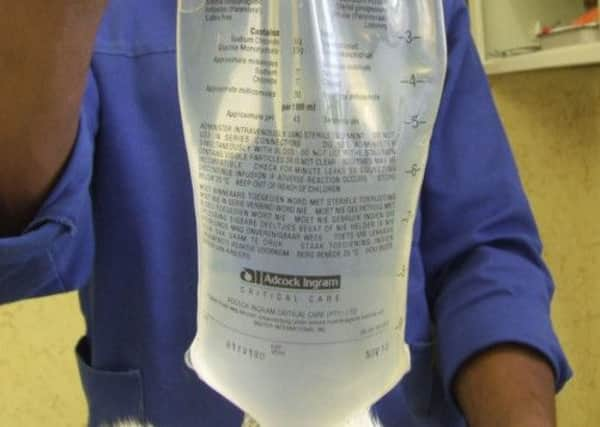Trauma patient drug withdrawn from UK


Health boards have been told to suspend the use of hydroxy-ethyl starch IV drips with immediate effect after the Medicines and Healthcare Products Regulatory Agency (MHRA) ruled that the benefits no longer outweighed the risks. Earlier this year, a report said they could be causing 250 deaths a year.
Hydroxyethyl starch drips are used to treat low blood volume or a steep drop in blood pressure. They can also be used for maintenance of circulation during surgical procedures as an alternative to saline drips.
Advertisement
Hide AdAdvertisement
Hide AdThe drug is often used for critically ill patients with sepsis, a bacterial infection of the blood, and those with burns or car crash injuries.
In recent days, health boards across Scotland have withdrawn the products, and now the German-based multinationals B Braun and Fresenius Kabi are recalling all UK stock of the starch drips.
The decision follows recommendations from European authorities after recent studies associated them with a greater risk of mortality or injury to the kidneys.
Dr Sarah Branch, of the MHRA, said doctors had already been avoiding using the drips due to claims about the effects.
“The use of these types of drips has fallen in the last year because of published evidence which shows that there is an increased risk associated with the use of hydroxyethyl starch products compared with simple salt solutions (crystalloids),” she said.
“Having considered the available evidence, and taken advice from the Commission on Human Medicines, we have decided to suspend their use in the UK.”
British hospitals use the starch-based colloid fluids far more than the alternative saline-based crystalloid fluids when compared with other countries, despite their being more expensive.
Earlier this year the London School of Hygiene and Tropical Medicine wrote to the NHS warning that the starch-based colloid fluids could be causing around 250 unnecessary deaths every year in the UK. Health chiefs have recommended the use of saline-based drips instead.
Advertisement
Hide AdAdvertisement
Hide AdMatthias Link, spokesman for Fresenius Kabi, which supplies the NHS with the drips, said that it is appealing against the recommendation by the European Medicines Agency, on which the UK’s decision was based.
He said that research used to justify the decision had been based solely on the experiences of critical patients and not on all of those who are given the drug.
“The research was based on research from critically ill patients only, and not on other patient groups such as trauma and surgical patients,” he said.
“For those patient groups, we have seen evidence which shows a positive risk/benefit ratio.”
Aileen Bryson, practice and policy lead at the Royal Pharmaceutical Society in Scotland, said: “When companies carry out their clinical trials to obtain a licence and bring a drug to market, they might test it on several thousand people and the side effects are considered manageable.
“If it is then widely distributed, it might be used by hundreds of thousands of people and only then can you see side effects not detected in the smaller population.
“In reality, the full safety profile of a medicine sometimes doesn’t become clear until it is used more widely in the marketplace.
“It may well be that if there is no other drug available – and it’s a life and death situation – the doctor might try this. However, in this situation it looks as if a safer alternative has been identified.
“Medicines are never withdrawn lightly, but this does happen occasionally when new evidence becomes available which alters the risk to benefit ratio.”